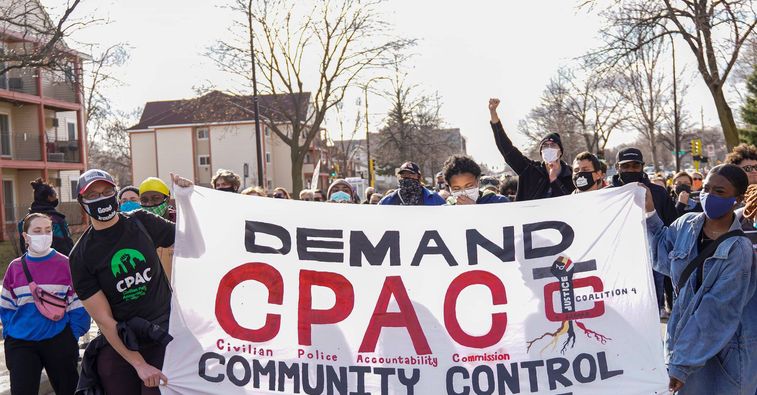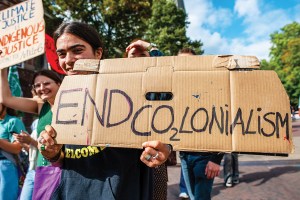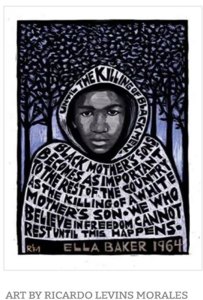Minneapolis could make history again if voters on Election Day embrace a “comprehensive” approach to public safety that looks beyond the police, potentially creating a community-driven model for the rest of the United States, where Black people are 3.5 times more likely to be killed by police than white people, and where Latinx and Indigenous people also face deadly police violence at disproportionate rates.
A ballot question that would fold police into a public safety department has defined the 2021 race for mayor in Minneapolis, Minnesota. BRANDON BELL / GETTY IMAGES
Now, the future of policing and public safety in Minneapolis is up for a vote.
Minneapolis could make history again if voters on Election Day embrace a “comprehensive” approach to public safety that looks beyond the police, potentially creating a community-driven model for the rest of the United States, where Black people are 3.5 times more likely to be killed by police than white people, and where Latinx and Indigenous people also face deadly police violence at disproportionate rates.
“Currently, state law requires licensed police officers to perform certain duties, and the charter amendment would not change current labor contracts with police…”
On Tuesday, Minneapolis voters will decide on Question 2, a ballot initiative driven by activists and organizers that would amend the city charter to replace the Minneapolis Police Department with a Department of Public Safety. If passed, Question 2 would not immediately remove police officers from the streets or the city’s payroll. Instead, proponents say, Question 2 would kickstart the process of expanding the city’s approach to public safety — such as dispatching unarmed social workers to help unhoused people and sending de-escalation experts to domestic disputes — rather than relying on the “armed-police only” approach.
To do this, Question 2 would remove a longstanding requirement that Minneapolis maintain a police force with a minimum number of officers and replace the police chief with a public safety commissioner who not only answers to the mayor but also city council. The Department of Public Safety could include police officers “if necessary,” according to the amendment’s highly-contested language. The existing police force would be transitioned into the new department as policymakers use new staffing flexibility to build out alternatives.
“Conservative forces in Minneapolis are pouring literally millions of dollars into fear-mongering, telling people that there will be no police within 30 days of the amendment passing, which is false”
Ultimately, cops would no longer be needed for “situations where they do not have proper training,” such as a mental health crisis, or interactions with people sleeping outside for lack of shelter, according to Yes4Minneapolis campaign. Opponents call Question 2 a “national experiment for defunding and abolishing the police” with “no clear plan” for what comes next, a claim that supporters say is both misleading and designed to stoke fear.
“Conservative forces in Minneapolis are pouring literally millions of dollars into fear-mongering, telling people that there will be no police within 30 days of the amendment passing, which is false,” said Sheila Nezhad, a Minneapolis organizer and candidate for mayor who helped write the ballot question, in an interview with Truthout.
Currently, state law requires licensed police officers to perform certain duties, and the charter amendment would not change current labor contracts with police, according to a city memo. Still, Question 2 could allow Minneapolis to replace police with other public safety professionals over time and reinvest resources back into neighborhoods, a process Nezhad said must involve high levels of community input.
“Nearly every single city in Minnesota has a department of public safety, not just police,” Nezhad said. “So, it’s sort of a bureaucratic shift in that way; it does open up big possibilities for us to fund these other strategies.”
The ballot question has divided Minneapolis, raising deep questions about the conditions in low-income neighborhoods that have led to gun violence on the cops’ watch, and why some people feel safer around police while others feel threatened. It’s also divided the four frontrunners in the race for mayor as leadership in the left-leaning city faces its latest reckoning over a string of police killings and brutality cases that put the department under federal investigation.
For information about free sessions in November and December go to CUAPB.org.
Incumbent Mayor Jacob Frey, a Democrat who says he has worked to reform the police department, has angered activists by opposing deeper structural changes. Frey, who opposes Question 2, is challenged from the left by Nezhad and Kate Knuth, two candidates who support the new “comprehensive” approach to public safety. A.J. Awed, a progressive attorney and war refugee from the city’s Somali community, opposes Question 2 but has called for a “Citizen’s Assembly” to decide on a “new model of public safety.”
Progressives have united around Nezhad and Knuth, urging voters list both candidates on their ranked-choice ballots and leave Frey’s name off altogether. Rep. Ilhan Omar, the outspoken progressive Democrat from Minneapolis, has endorsed Nezhad and Knuth and a “yes” vote on Question 2.
Knuth is a former state lawmaker, environmental advocate and climate expert. Nezhad arose from the coalition of unions and social justice groups such as Reclaim the Block and the Minnesota Youth Collective that put Question 2 on the ballot. A win for Nezhad and Question 2 would be a clear signal that voters in Minneapolis are ready to move beyond the “armed-police only” model.
Knuth and Awed did not respond to a request for comment. Frey’s campaign declined an interview and did not answer a list of questions in an email.
The Frey campaign’s internal polling shows the mayor leading Nezhad by 14 points, with Knuth trailing further behind. Frey has easily outraised his opponents, but Nezhad said she has a dedicated ground team knocking on thousands of doors. Nezhad outperformed Frey in a runoff for the Minneapolis Democratic Farmer-Labor Party’s endorsement but did not reach the 60 percent threshold needed to win. Frey has the fundraising advantage ahead of Election day, but with the city’s ranked-choice voting system, the mayor could still lose if enough voters “don’t rank Frey.”
“I am the public safety candidate in this race,” Nezhad told Truthout. “I have spent years working as an organizer and as a policy analyst and budget analyst around community safety strategies and safety beyond policing in Minneapolis, and I have a demonstrated track record of being successful here in the city.”
Nezhad points to her work with Reclaim the Block, a group at the forefront of the police divestment movement that helped create the Minneapolis Office of Violence Prevention and secure $8 million in funding from various sources. An alternative to police, the municipal agency takes a public health approach to preventing street violence, particularly among youth, and recognizes that violence has roots in economic and political conditions such as racism, poor housing and community divestment. Frey says he allocated $2.5 million in city funding for the violence prevention programs, and the frontrunners in race for mayor have all focused their campaigns improving housing.
The violence prevention office recruits “violence interrupters” to work on neighborhood teams to de-escalate conflict on the streets, a model that has proved effective at preventing gun violence in other cities. Nezhad said passing Question 2 would help these programs expand along with investments in “youth programing and youth jobs.” Dissolving the police department into a public safety office would also give people more options when they call for help.
“So, I have been thinking about this for quite a long time, and when [Question 2] passes, we will keep fully funded 911 and 311 response, but we will add more options,” Nezhad said.
Nezhad said the city now has four “mental health responders” who respond to emergency calls, but more are needed to serve an entire city. Minneapolis is not alone. Across the country, cities are building teams of medics and counselors to respond to mental health crises without police. The Justice Department is currently investigating the abuse of people with behavioral disabilities by Minneapolis police.
“So, scaling up that program, more domestic and sexual violence advocates, more violence, interrupters, more gun violence prevention specialists, all these kinds of increased options for response for the types of calls that police don’t need to be sent to, and for people who are afraid to call the police when they need help,” Nezhad said.
Question 2 opponents say dissolving the official police department is an “experiment,” but supporters say it is simply the first bureaucratic step toward reallocating resources and taking a more comprehensive approach to public safety. Nezhad describes her opponents as “pro-cop” and supporters as “abolitionist,” but her campaign is not calling for police to abolished — at least not right away.
“I think some folks want it to be the entire package of change, which if you look at the history of civil rights movements across issues, electoral politics is a small part of it, right?” Nezhad said. “Most of it is changing our collective consciousness and understanding and social contracts of how we treat one another and help one another.”
Nezhad’s rhetoric tacks closer to the “defund the police” protest slogan; the candidate said her city has cut funding to schools and social services for decades while pouring money into policing and jails. Reversing course will take time and plenty of community input, but Nezhad believes her city is ready.
Despite chaos and police repression following the murder of George Floyd, people kept protesting and demanding accountability from city leaders while building networks of mutual aid and debating new visions for community safety. After a cop fatally shot Daunte Wright during a scuffle following a traffic stop in April 2021, Nezhad said people “kept coming out night after night” to protest as police deployed tear gas and rubber bullets.
“I mean, that’s why I’m running for mayor, because I’ve seen the widespread transformation on the ground,” Nezhad said. “People stepping up to take care of one another to protect our communities and boldly and fearlessly protests injustice, and our elected officials have failed to meet the moment.”
One Comment
Comments are closed.





Although society (including me) needs law-enforcers to protect the law-abiding and vulnerable people, I believe that to have a reasonable idea of how law-enforcers will behave, one must understand what underlying nature/desire motivated them to their profession to start with. Maybe many law enforcers target/acquire such authoritative fields of employment mainly for ‘power’ reasons, though perhaps subconsciously.
It is, after all, a profession in which, besides the basic tackle and/or handcuffing, adrenalin-pumped employees might storm into suspects’ homes, screaming, with fully-automatic machineguns or handguns drawn, at the homes’ occupants, all of whom, including infants, can be permanently traumatized from the experience. Occasionally the law-enforcers force their way into the wrong home, altogether; that is when open-fire can and does occur, followed by wrongful deaths to be ‘impartially’ investigated.
Almost all of us guys, as some gals, have as children fantasized about, and even planned for, a future as law enforcers in some form or another. But almost all of us, probably sooner than later, grew out of that dream, as it wasn’t reflective of our nature. Those who deliberately get into such professions of (potential or actual) physical authority might do some honest soul-searching as to truly why. Although that may sound cynical, I believe there is much truth to it. It must also be kept in mind that there are people who leave law-enforcement professions after witnessing misconduct within.